Filter by
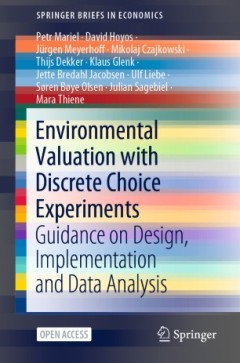
Environmental valuation with discrete choice experiments : guidance on design…
This open access book offers up-to-date advice and practical guidance on how to undertake a discrete choice experiment as a tool for environmental valuation. It discusses crucial issues in designing, implementing and analysing choice experiments. Compiled by leading experts in the field, the book promotes discrete choice analysis in environmental valuation through a more solid scientific basis …
- Edition
- -
- ISBN/ISSN
- 9783030626693
- Collation
- xiii, 129p. : ill.
- Series Title
- -
- Call Number
- 333.7 ENV e
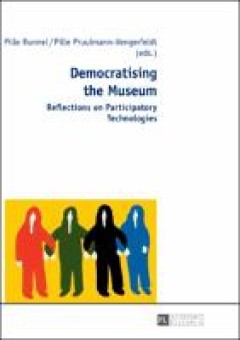
Democratising the museum : reflections on participatory technologies
Democratising the museum is a collection of articles reflecting upon the problem of how participation, technologically mediated or not, can support the museum in the process of becoming more accessible. The open museum shares power with its visitors while negotiating professionalism and the role of the museum in a modern society. The book looks at the roles and struggles of audiences/visitors a…
- Edition
- -
- ISBN/ISSN
- -
- Collation
- 240 p.
- Series Title
- -
- Call Number
- 069 DEM d
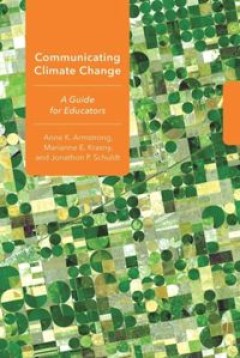
Communicating climate change : a guide for educators
Environmental educators face a formidable challenge when they approach climate change due to the complexity of the science and of the political and cultural contexts in which people live. There is a clear consensus among climate scientists that climate change is already occurring as a result of human activities, but high levels of climate change awareness and growing levels of concern have not …
- Edition
- -
- ISBN/ISSN
- 9781501730801
- Collation
- IX, 131 p.
- Series Title
- Cornell Series in Environmental Education
- Call Number
- 363.73874071073 ARM c
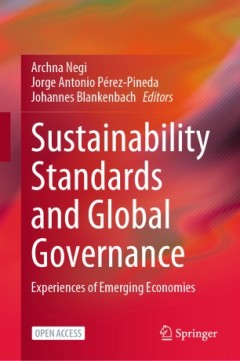
Sustainability standards and global governance : experiences of emerging econ…
This open access book focuses on the issue of sustainability standards from the perspective of both global governance frameworks and emerging economies. It stems from the recognition that the accelerated pace of economic globalization has generated production and consumption patterns that are generating sustainability concerns. Sustainability standards (and regulations) are increasingly being u…
- Edition
- -
- ISBN/ISSN
- 9789811534737
- Collation
- xxvii, 224p. : ill.
- Series Title
- -
- Call Number
- 338.927 SUS s
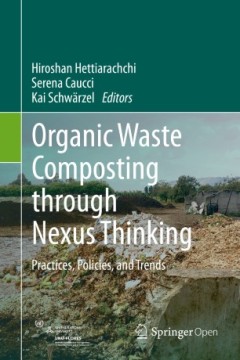
Organic waste composting through nexus thinking : practices, policies, and tr…
Organic waste composting is another excellent example to demonstrate the power and the benefits of nexus thinking. Even though organic waste composting itself is not a new topic, those who want to start a new project or align an ongoing project with nexus thinking, find it difficult to gather the necessary information. With nine case studies from four continents, this book aims to fill above ga…
- Edition
- -
- ISBN/ISSN
- 9783030362836
- Collation
- viii, 232p. : ill.
- Series Title
- -
- Call Number
- 668.6375 ORG o
International rainwater catchment systems experience
Harvesting rain and using it for drinking and domestic use will help to give scattered rural households and under-served city dwellers access to water. The world cannot ignore using rain - as the source of all water. This book presents stories and experiences from some 15 countries from all over the globe, developed and less developed. There are many more experiences that can be highlighted, bu…
- Edition
- -
- ISBN/ISSN
- 9781789060584
- Collation
- xxiii, 245p.: ill.
- Series Title
- -
- Call Number
- 628.142 INT i
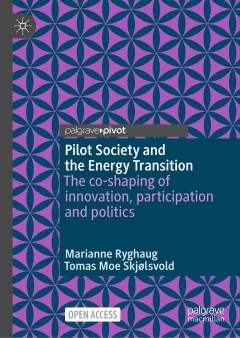
Pilot society and the energy transition : the co-shaping of innovation, parti…
This open access book examines the role of pilot and demonstration projects as crucial devices for conducting innovation in the context of the energy transition. Bridging literature from sustainability transitions and Science and Technology Studies (STS), it argues that such projects play a crucial role, not only in shaping future energy and mobility systems, but in transforming societies more …
- Edition
- -
- ISBN/ISSN
- 9783030611842
- Collation
- vii, 130p. : ill.
- Series Title
- -
- Call Number
- 354.3 RYG p
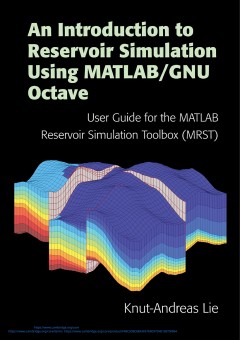
An introduction to reservoir simulation using MATLAB/GNU Octave : user guide …
This book provides a self-contained introduction to the simulation of flow and transport in porous media, written by a developer of numerical methods. The reader will learn how to implement reservoir simulation models and computational algorithms in a robust and efficient manner. The book contains a large number of numerical examples, all fully equipped with online code and data, allowing the r…
- Edition
- -
- ISBN/ISSN
- 9781108591416
- Collation
- xv, 660p. : ill.
- Series Title
- -
- Call Number
- 622.338 LIE i
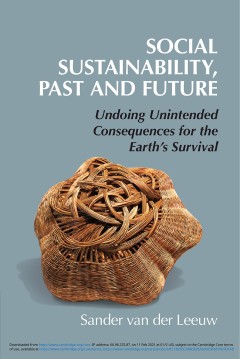
Social sustainability, past and future : undoing unintended consequences for …
In this book, Sander Van der Leeuw examines how the modern world has been caught in a socio-economic dynamic that has generated the conundrum of sustainability. Combining the methods of social science and complex systems science, he explores how western, developed nations have globalized their world view and how that view has led to the sustainability challenges we are now facing. Its central t…
- Edition
- -
- ISBN/ISSN
- 9781108595247
- Collation
- xvi, 516p. : ill.
- Series Title
- -
- Call Number
- 304.2 VAN s
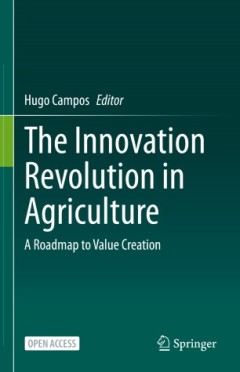
The innovation revolution in agriculture : a roadmap to value creation
This open access book is an important reframing of the role of innovation in agriculture. Dr. Campos and his distinguished coauthors address the need for agriculture to feed a growing global population with a reduced environmental footprint while adapting to and mitigating the effects of changing climate. The authors expand the customary discussion of innovation in terms of supply driven R&D to…
- Edition
- -
- ISBN/ISSN
- 9783030509910
- Collation
- xix, 234p. : ill.
- Series Title
- -
- Call Number
- 338.16 HUG t
 Computer Science, Information & General Works
Computer Science, Information & General Works  Philosophy & Psychology
Philosophy & Psychology  Religion
Religion  Social Sciences
Social Sciences  Language
Language  Pure Science
Pure Science  Applied Sciences
Applied Sciences  Art & Recreation
Art & Recreation  Literature
Literature  History & Geography
History & Geography